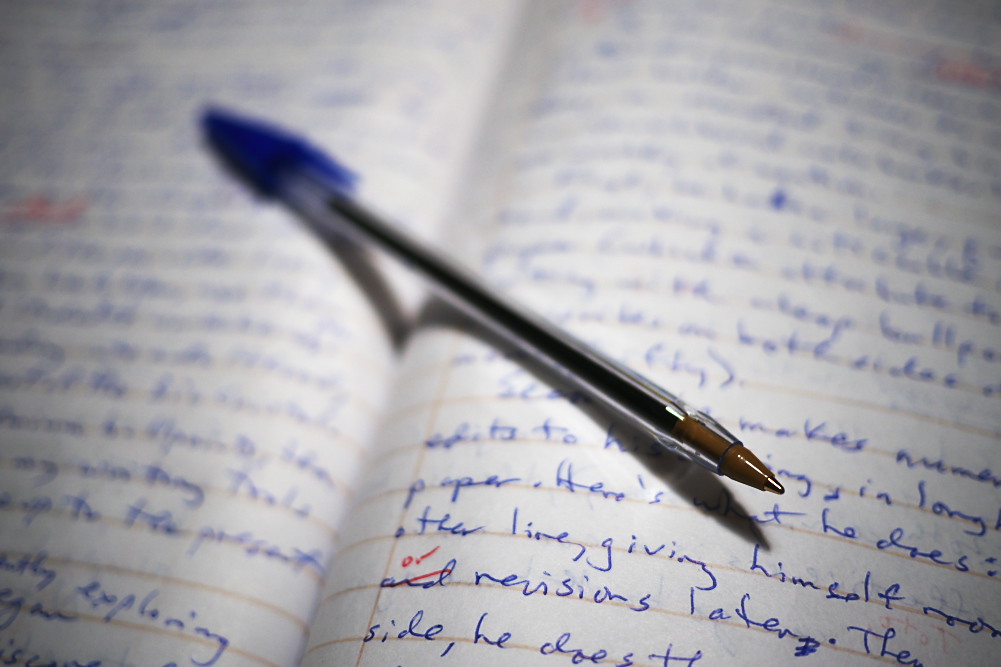Thoughts on Penmanship

I was reading the New Yorker's website today and came across an interesting story about the teaching of cursive in schools. As anyone knows who has paid any attention to or interest in the subject, or has children in school, it will come as little surprise to know that fewer school systems are teaching cursive writing skills. Much of this has to do with the way that "written" communication is now conducted, via the intermediary of email and texting, instead of ink on paper.
The author of the New Yorker piece was describing his personal experience with his child at summer camp, how he was the only parent who sent postal letters, written longhand, instead of email, to his child.
For many of us who grew up with longhand, ceding those hard-earned skills to technological innovation seems instinctive, yet is a futile battle not worth fighting. Certainly we can do our own part in finding ways to keep those cursive skills in personal use. But resisting the tide of change that has swept over education seems out of our reach, a bridge too far. Who are we to fight the Board of Education?
The part of the New Yorker article I found most striking was the author recounting how, after sending numerous letters to his kid's summer camp, he suddenly wondered if she had been able to read them at all. It turns out that she had to enlist the aid of her camp counsellor in order to get through them. This is the part of the story that is most sobering, the idea that cursive can seem an entirely foreign language to those not adept at its interpretation.
Like most kids raised in the 1960s, I was taught the classic Palmer method of cursive in grade school, sticking with it until, in high school, my habit of rapid note-taking reduced my cursive skills to a haphazard printed scrawl, which it remains to this day. Any attempt to produce textbook-quality cursive for me now is akin to performing calligraphy, a purposeful, slow process of consciously forming each letter; not the flowing ease of writing the technique originally intended.
Perhaps this is one reason why I enjoy the use of manual typewriters so much, the ability to produce legible printing at a rapid pace while enjoying the mechanical interaction. Then there is the observation that, although I enjoy owning and using fountain pens with my coarse scrawl, they are best employed with a cursive hand, to facilitate the continuous flow of ink such a pen demands.
I have some close friends whose kids, now grown, were home schooled, and taught an elegant, printed hand instead of cursive. Their letters are wonderfully legible, even more so than cursive which, though somewhat readable retains some of the more complex flourishes of earlier techniques. So while I can lament the demise of cursive, it's not so much about that particular style of handwriting as it is about handwriting in general being displaced by keyboarding.
I've noticed this phenomenon about pens, especially ballpoints, how they seem to be treated by many people as equivalent to toilet paper, in the sense of not seeming to possess much intrinsic worth or value. These days, if you permit someone, even an intimate family member, to "borrow" a pen, you know with almost absolute certainty that you will never see that writing instrument again, regardless of its actual value. I suspect this has something to do with the value that our culture places upon handwriting as a form of communication, which can seem to many as redundant.
Of course, to us office supply geeks, pens, any pen - even the lowly Bic Cristal - are objects of reverence and honor.
It is perhaps ironic that I was, just this morning, scribbling in my composition book with a fountain pen, in my almost illegible scrawl that is far from the ideal of the Palmer method, prior to happening upon that New Yorker article. And it is with even more irony that this article is being keyboarded instead of handwritten; though I've done few if any pen-casts in my blog over the years, mainly because I respect my readers too much to demand that they attempt to decipher my chicken scratchings.
It is for these reasons that I see my handwriting as best suited for note-taking, brain-storming or first-draft, early-stage writing, an entirely personal activity, intended for private consumption only.
One of the things I find so satisfying about handwriting, whether cursive or otherwise, is that it employs one of those primary physiological attributes that defines us as human, that being the dexterity of our hands. Little wonder that writing is one of the "humanities," and penmanship such an essential historical antecedent to today's writing technology.
Labels: writing

4 Comments:
I still believe we can fight the so-called educators to teach cursive as well as many classes the schools ignore due to the Georgey Bushy no child crap requiring only coaching students to pass standard tests.
I too had good penmanship until college. One class I should have taken was shorthand. Something all college bound students should have taken, but like 99% of schools it was taught only to business or secretary students and the classes closed to other students as an elective course.
The one class I hated most (due to the way it was taught) was typing. The one class that became the most important for most of my life, typing. Had I not learned touch typing I would have been one of those students who did not know how to type my essays and formal reports or program with any speed/accuracy.
Now I seldom pencast due to my crappy scribbles. I force myself to regain neat penmanship by using a fountain pen. The progress is slow. I think that is why as adults when we loose our writing skill we are too impatient to regain it. Much faster and easier to keep scribbling even if no one else can read it. Worse--sometimes I cannot read my own writing!
I'll add to that...let's say that a group of individuals all copy the same notes on electronic devices, then typewriters and finally hand written. The electronic compositions will be identical, the typewritten compositions can all be traced to individual typewriters however the handwritten compositions can all be traced to each and every individual. i.e. is handwriting the one (or only) sure method of maintaining one's true identity, integrity?
John M - Toronto
As a collector of both typewriters and vintage fountain pens, I find there is room in my life for both. It's an "and", not an "or". However, it's a personal thing, and what works for me might not work for somebody else. I've stopped wringing my hands over whether or not cursive should/should not be taught to children. It will evolve to wherever it is going regardless of what I think about it. Cursive handwriting will not go away, it will just move to a different spot in our cultural life, just the way typewriters have.
You know my views on handwriting, Joe. It's as distinctive as one's voice. I spent about a month or so last year working on changing the style of my upper-case letters because I felt that they didn't match my lower-case ones. A cheap notebook from a stationery store, a couple of fully loaded fountain pens, and five or ten minutes a day, writing nonsensical sentences and random words until I reached a point that I was happy with. I'm still making subtle changes to some letters (my upper-case 'R' still needs finessing), but I'm fairly happy with how my writing now looks. Especially if I write when I'm well-rested/alert, seated comfortably, and have a decent pen (fountain/ballpoint/pencil)in my hand.
Post a Comment
<< Home